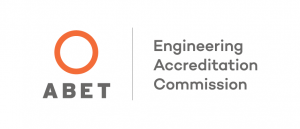
UMBC’s B.S. in Chemical Engineering is accredited by the Engineering Accreditation Commission of ABET, https://www.abet.org, under the General Criteria and the Chemical Engineering Program criteria.
Program Educational Objectives
The department faculty, in consultation with various program constituencies, established the following Program Educational Objectives – the “Five C’s”. These broad statements describe what our graduates are expected to attain within a few years of graduation and are based on the needs of our constituencies.
Program Educational Objectives – “The Five C’s”
Within three to five years after graduation:
- C1. Graduates will have Competency in the Practice of Chemical Engineering.
- C2. Graduates will have Critical Thinking Abilities that enable them to solve complex engineering and related technical problems.
- C3. Graduates will have the ability to work in Cooperation with Diverse Teammates.
- C4. Graduates will be effective Communicators.
- C5. Graduates will have demonstrated their Commitment to Life-Long Learning, and ethical responsibility.
Student Outcomes
Our Student Outcomes describe what students are expected to know and be able to do by the time of graduation. These relate to the skills, knowledge, and behaviors that students acquire as they progress through the program. Our seven Student Outcomes are related to our Program Educational Objectives and also map to the outcome requirements of ABET Criterion 3.
CBEE STUDENT OUTCOMES
- Students will have an ability to identify, formulate, and solve complex engineering problems by applying principles of engineering, science, and mathematics.
- Students will have an ability to apply engineering design to produce solutions that meet specified needs with consideration of public health, safety, and welfare, as well as global, cultural, social, environmental, and economic factors.
- Students will have an ability to communicate effectively with a range of audiences.
- Students will have an ability to recognize ethical and professional responsibilities in engineering situations and make informed judgments, which must consider the impact of engineering solutions in global, economic, environmental, and societal contexts.
- Students will have an ability to function effectively on a team whose members together provide leadership, create a collaborative and inclusive environment, establish goals, plan tasks, and meet objectives.
- Students will have an ability to develop and conduct appropriate experimentation, analyze and interpret data, and use engineering judgment to draw conclusions.
- Students will have an ability to acquire and apply new knowledge as needed, using appropriate learning strategies.
Enrollment and Graduation Statistics
Chemical Engineering Program – Enrollment and Graduation Statistics
Enrollment and graduation data are located on the College of Engineering and Information Technology (COEIT) web site: http://coeit.umbc.edu/enrollment-graduation-data/ .